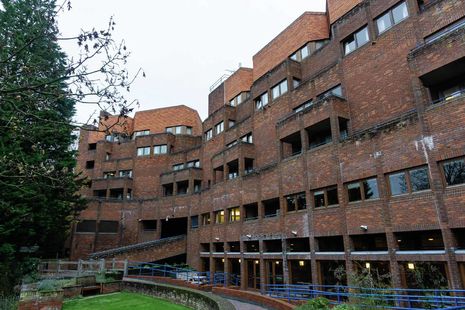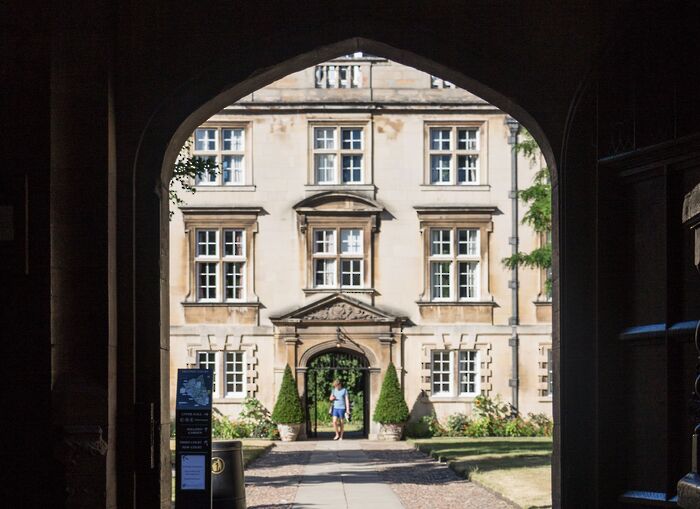New student report rebuts Robinson’s Living Wage policy
The Robinson Living Wage Campaign argues paying all its staff the Living Wage would cost less than 1% of the College’s endowment.

The Robinson Living Wage Campaign released a new report presenting renewed arguments to the College about paying its staff the Real Living Wage yesterday.
The report, based on Robinson’s 2018 financial accounts, claims the college “been increasing their endowment by millions each year, whilst non-academic staff pay has stagnated since 2012”. It estimates based on this data, paying all non-academic staff the Real Living Wage to all the staff would amount to 0.002% of its yearly invested endowment.
In 2018, Robinson paid 128 workers below the Real Living Wage - which in Cambridge stands at £9.30 - more than any other college in the University.
The report comes after the College refused to respond to parts of a Freedom of Information request for employment data of 2019 on the grounds the information could affect future staff recruitment and student enrollment.
It further rebuts claims from the College that it cannot afford the cost of paying the Living Wage by pointing to the size of recent increases in the college’s wealth. Based on these previous accounts, the report claims the College has earned £14.6 million from its investments.
In response to Varsity's inquiry, a spokesperson from Robinson said that the College has provided adequate explanation on how its commercial concerns justify the amount of information they have provided.
They continued that the college made an adjusted operating deficit of £302,000 in 2018, which is how they measure financial operating performance.
2019 saw a weaker financial year for the college, with a £2 million (3.4%) return on investments, partially due to increased pension costs. However, the report notes the college nonetheless stated in its accounts that it is still in a financially strong position.
The report suggests these figures mask the true financial capabilities of the college particularly as “interest on a large outstanding loan that the college is paying back has been moved into operational costs, but investment growth has not”.
The report further claims Robinson’s resistance comes as its warden, the equivalent of master or president, was the highest paid in Cambridge as of 2017.
A spokesperson from Robinson College said the Warden has one international trip per year funded by the College and contested the claim that the Warden is the highest paid in 2020, but did not give details on current salaries.
A spokesperson from the Robinson Living Wage Campaign said “time and time again, Robinson have claimed that they are financially unable to improve working conditions for their lowest paid staff, but our findings show these statements to be nothing more than lies and disinformation.”
“We hope that college will take our report as an opportunity to open up an honest dialogue with students and workers about how our institution can help remedy the stark social divisions in the city”.
The Campaign has been given added urgency after Cambridge was named the most unequal city in the UK earlier this week. There is a widespread feeling that the failure of many colleges to pay the Living Wage contributes to this.
A spokesperson from CUSU Ethical Affairs Campaign said that Robinson “actively plays a part in the maintaining of huge income disparity in one of the most unequal cities in the UK” in its refusal to pay the Living Wage. They added “students will continue to work to uncover their [colleges’] unethical employment practices” until the Living Wage is paid across all colleges.
The Robinson Living Wage Campaign is part of the wider Cambridge University Living Wage Campaign which aims to make all Colleges accredited institutions. Currently, eight colleges pay the Living Wage to all their workers, according to the Taylor’s Table released in November. Meanwhile, Queens’ and Girton are the only two colleges that are accredited by the Living Wage Foundation.
A spokesperson for Robinson told Varsity the college “values its staff and recognises the significant contribution they make to every aspect of College life. We routinely engage directly with staff on their concerns, including around pay, and have mechanisms in place to facilitate this.”
The Real Living Wage is calculated by the Living Wage Foundation by using a basket of goods from the Minimum Income Standard and tries to take into account regional differences in the cost of living.
Unlike the minimum wage, institutions voluntarily sign up to become Living Wage accredited. Currently over 180,000 employers have received a pay rise as a result of the Living Wage Campaign while nearly 6,000 businesses have become accredited Living Wage Employers.
This article was edited to amend the source from Robinson College as the source did not want to be named.
 Comment / Plastic pubs: the problem with Cambridge alehouses 5 January 2026
Comment / Plastic pubs: the problem with Cambridge alehouses 5 January 2026 News / Cambridge businesses concerned infrastructure delays will hurt growth5 January 2026
News / Cambridge businesses concerned infrastructure delays will hurt growth5 January 2026 News / New movement ‘Cambridge is Chopped’ launched to fight against hate crime7 January 2026
News / New movement ‘Cambridge is Chopped’ launched to fight against hate crime7 January 2026 News / AstraZeneca sues for £32 million over faulty construction at Cambridge Campus31 December 2025
News / AstraZeneca sues for £32 million over faulty construction at Cambridge Campus31 December 2025 Interviews / You don’t need to peak at Cambridge, says Robin Harding31 December 2025
Interviews / You don’t need to peak at Cambridge, says Robin Harding31 December 2025










